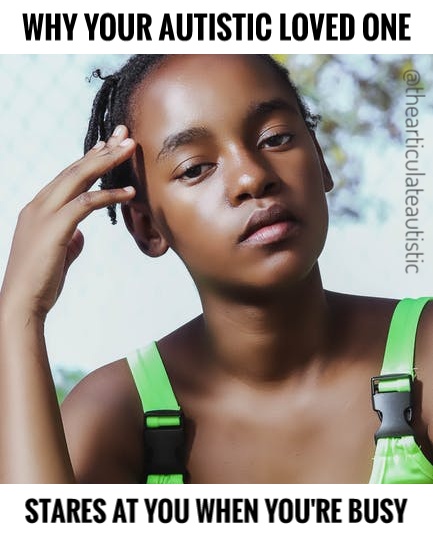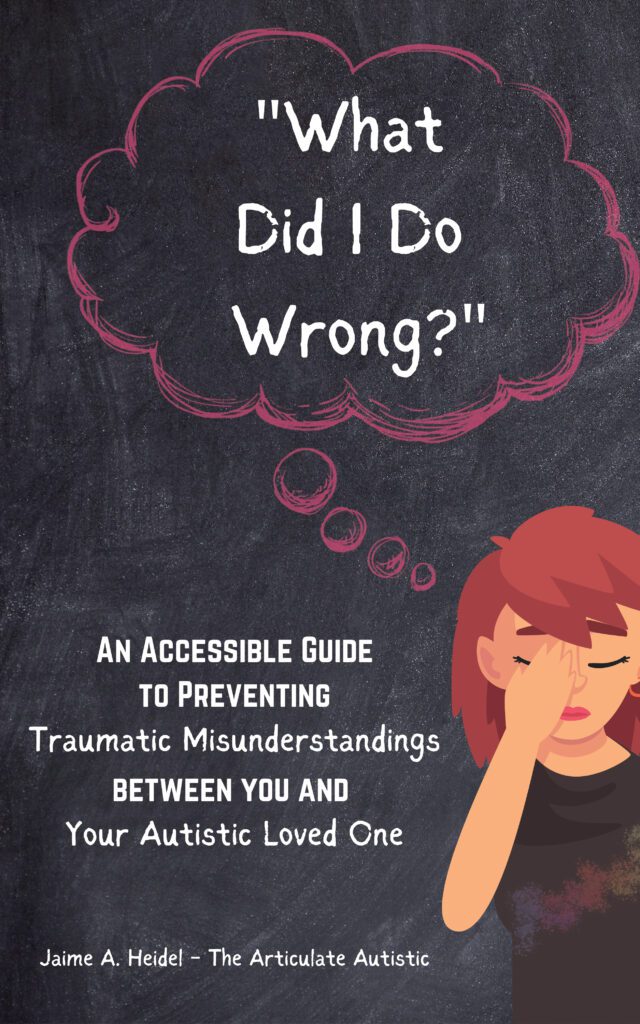Why Your Autistic Loved One Stares at You or Paces When You’re Talking to Someone Else (or Otherwise Busy)

If you have an autistic loved one who often stares at you from across the room while you’re talking to someone else, comes up to you and stares at you, or maybe even paces around back and forth looking as though they may have something to say but yet they don’t, you may be wondering what that’s about.
When I was a child, I remember constantly being asked, “Why are you staring at me!?” or “Why are you just standing there with your mouth hanging open?!” or “Why are you eavesdropping? This is a private conversation.” or (and I’m really showing my age here) “This is an AB conversation, C your way out of it.”
The thing is, most autistic people need to do things in order. So, let’s say Mrs. Jones told me to tell Mrs. Smith, “The package is on the porch.” So, what I would do as a child is repeat to myself over and over and over again, “The package is on the porch.” “The package is on the porch.” “The package is on the porch.”
And, I would do this until I located Mrs. Smith. I absolutely could not WAIT to get this buzzing little bee of a thought out of my head because it’s ALL I could think about. It was all-consuming, and I couldn’t do anything else, I couldn’t think of anything else other than, “The package is on the porch.”
But, when I walked up to Mrs. Smith, I would notice she was having a conversation already, and this would be distressing to me. After all, I learned that interrupting people is NOT OK by neurotypical social standards, so I would stand and wait to say what I needed to say because I couldn’t go about my business and do other things while I stored the important sentence of, “The package is on the porch.” in my head.
So, unfortunately, what it ended up looking like was that I was either eavesdropping, stalking, staring, or pacing for attention. When really I just had something to say, and I had no idea how to convey that without fear of being yelled at because, in the past, I had interrupted somebody or I tried to say “excuse me” the way I was taught, yet my tone of voice was considered wrong, so I would just sit there and wait for the person to finish speaking, and then I would blurt it all out in one fell swoop.
Oftentimes, what I blurted out didn’t even make sense, so I can imagine now that I’m an adult how that must have looked. But, as a child, all I knew is there was a buzzing bee in my head, and I had to get the information out, and I had to convey it quickly because I didn’t want to lose it to my terrible working memory and short-term memory. Also, I didn’t want Mrs. Jones to be mad because I didn’t give the information to Mrs. Smith like I promised I would.
In addition to staring or pacing (which I just thought of as waiting politely), I would also stop whatever I was doing and go right up to Mrs. Smith as soon as I found her. Let’s say, hypothetically speaking, I had a pair of scissors in my hand when Mrs. Jones conveyed the message; I would walk up to Mrs. Smith while she was talking to someone else, and I would stand there with a blank face and a pair scissors in my hand (and they may have been really large scissors that I was holding up with the point facing upward), but I had no idea that I was holding scissors anymore!
So, if it looked as though I was standing there with a blank facial expression and a pair of scissors like Michael Myers about to throw down, it’s because I was no longer thinking about scissors. They didn’t exist anymore nor did the task I was doing with them before I was told by Mrs. Jones to convey the message to Mrs. Smith. The only thing that existed was “The package is on the porch.”
That’s all there was in life until I got that out of my brain, and I said those words. I could not continue with life at all. I couldn’t move on to step C because step B hadn’t been completed. Step A was whatever I was doing before, and step B was, “The package is on the porch.” Until step B was completed, I could not go on to step C or even back to step A. I was stuck and distressed.
So, if your autistic loved one seems to appear out of nowhere and stares at you or paces back and forth while you’re in the middle of a task, or it seems like they’re eavesdropping on your conversation, it may just be that they have something that they have to convey to you in some way, and they need to tell you RIGHT NOW before they can do anything else.
To get a better understanding of this, refer back to my “Why Your Autistic Loved One Often Interrupts Conversations” article. It’s for the same reason. It’s just that we need to get that sentence out because many of us have poor memories, and, also, many of us struggle with being able to go from task A to task C and circle back around to task B. That’s just not the way our brains work. We are very linear.
So, the next time you see your autistic loved one staring at you or pacing or appearing to be eavesdropping, understand that they probably have something they want to communicate with you (whether verbal or nonverbal), and they have been taught either implicitly or explicitly that interrupting is not OK, and so will just sort of hang back and stare at you hoping you will prompt them.
Even if we’ve been taught to say “excuse me” before interrupting, we may not have said it in a tone of voice that neurotypical people found unacceptable in the past (and we were soundly punished for it), so we will hang back, distressed and unsure of how to proceed because we’ve been yelled at in the past.
If you notice this behavior, ask us in a calm and even tone if there is something we’d like to say, and don’t be surprised if it all comes out in a rush. That information can be very hard to hold and finally getting to speak can be as relieving as finally getting to use the bathroom after hopping around for an hour.
Learn more about how your autistic loved one thinks, feels, and experiences the world by picking up your copy of my book, “What Did I Do Wrong?”





My poor husband. I am frequently gazing until he notices so I can share some important update on a random thought or very important piece of social media entertainment involving a dog or whatevs. Sometimes I just dive right in, but I have been learning that even my spouse/best friend can be overwhelmed by the amount of information I need to share on a frequent basis. So, gazing. (Kind of like my dog does, too, because thoughts, she haz them. Yes I relate myself to my dog on an equal footing, and dogs to people likewise. Fight me.)